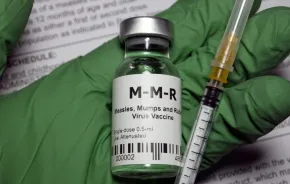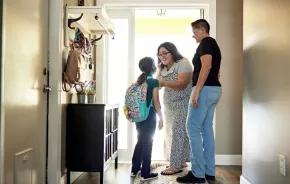We've all met a few of them: The 3-year-old who orders off the menu.
The 4-year-old who can name all the states and their capitols. The
2-year-old who can add and subtract, and the kindergartener whose
vocabulary is so advanced you'd like to elect him senator.
We call them "gifted," though some educators prefer the label "highly capable."
Terminology aside, we're talking about very bright children who
typically score 130 or above in IQ tests -- placing them in the top 2-3
percent of the population.
If your child is one of these kids, chances are you already know.
"Parents can usually recognize if their child is advanced in some way
-- with vocabulary, for example, or with numbers," says Nancy Robinson,
Ph.D., professor emerita at the University of Washington and former
director of the Halbert and Nancy Robinson Center for Young Scholars.
"And parents are generally right about their children; they can trust
their gut instincts."
Parents might notice their child is unusually good at jigsaw puzzles
and has an excellent memory. Or they may discover their child is
exceptionally creative.
Gifted children also posses excellent memories and problem-solving
abilities, long attention spans, remarkable curiosity, a great sense of
humor and the ability to learn quickly, according to the
"Characteristics of Giftedness" scale developed by Linda Kreger
Silverman, who directs the Gifted Development Center in Denver,
Colorado.
Often, gifted children have different emotional needs than other
youngsters, says Wilder Dominick, head of The Open Window School in
Bellevue. "They are much more sensitive and perfectionistic; there's an
inflexibility about their thinking; it may be hard for them to see
other points of view."
Let's say you've concluded your child's gifted. Now what?
For starters, relax, advises Dr. Gail Rosenberg, an Eastside
psychologist. "Most parents are very anxious about providing the ideal
experience if they have a child who is gifted in one or more ways," she
says. "Even if you don't provide the exact right amount of stimulation,
your children will do fine. You have to be a good-enough parent, not a
perfect parent."
Should you have your child tested? Yes -- if there's a reason for it,
such as applying to school, Robinson says. "Otherwise, wait until it
serves a purpose. Don't test for testing sake; it's useless and
expensive."
In the meantime, immerse your child in activities, books and interests
that promote investigation and imagination, suggests Michael Murphy,
Seattle Country Day School head. "Instead of an easy puzzle, find
hands-on pursuits in which kids can explore creating and designing
their own projects," Murphy says. "These kinds of things allow for
divergent thinking."
When it comes time for kindergarten, select your child's academic
environment with great care. "People often assume that a child who is
gifted will succeed anywhere," Dominick says. "This is not true. Gifted
children have a set of needs that are very difficult to meet -- and are
very complex."
Robinson agrees. "The bright kids won't do fine on their own; they'll
rev down their motors and go along with the flow. Some will become
discouraged and depressed."
That's why parents should seek an educational program that fuels their
child's curiosity and encourages discovery and high-level thinking,
Dominick advises. "Bright kids don't need as much time on drill and
practice. They think outside the box and synthesize ideas. If things
are too predictable, these kids will lose engagement."
It's important that highly capable children don't feel different or
marginalized, Dominick says. "They should be surrounded with other kids
who think at the same level of complexity they do."
Parents seeking independent schools that serve gifted children have
many options in the Seattle-Tacoma area. Seattle Country Day School,
The Open Window School, The Evergreen School and University Child
Development School in Seattle all offer programs for academically
capable children, as does the Seabury School in Tacoma.
Public school options for gifted students vary. Seattle Public Schools,
for example, offers three programs: the Accelerated Progress Program
(APP) for highly gifted children; Spectrum for those testing in the
90-plus percentile range; and an accelerated curriculum for students
whom teachers identify as eligible.
Mercer Island schools implemented a gifted program this year for grades
3 and 4 -- they'll add grade 5 next fall -- and the Bellevue School
Distinct features the GATE (Gifted and Talented Education) program for
grades 1-8.
If a child has no access to a specially designed program, parents
should request a private conference with their child's teacher,
Robinson suggests. Then ask the teacher to try something new and
innovative. Could this first-grade child do math with the second
graders? Could he be excused from reading so he could work on another
project?
Parents, Robinson says, must act as their child's advocates. "Teachers
are overwhelmed. Even though they have your child's interest at heart,
your child could fall through the cracks," she says. "Parents should
come up with ideas that might be helpful in meeting their child's
needs."
Linda Morgan writes frequently on education issues for ParentMap.









